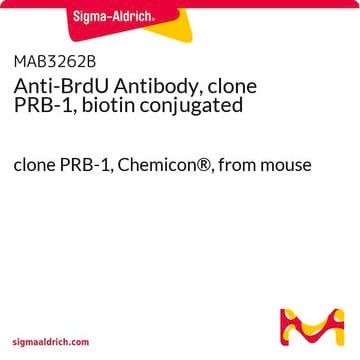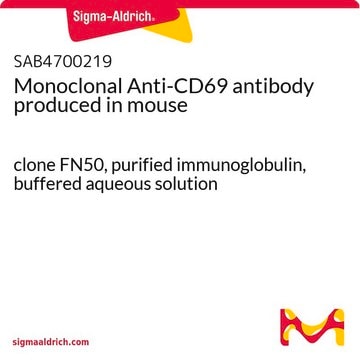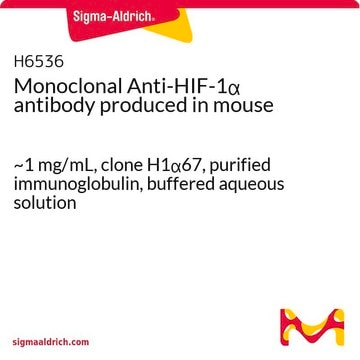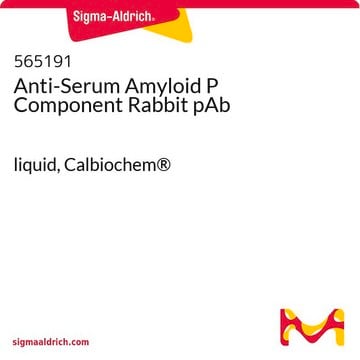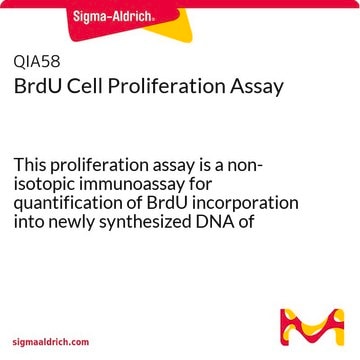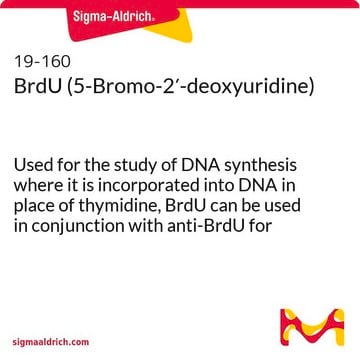SAB4700630
Monoclonal Anti-5-bromodeoxyuridine antibody produced in mouse
clone MoBu-1, purified immunoglobulin, buffered aqueous solution
Szinonimák:
Anti-BrdU
Bejelentkezésa Szervezeti és Szerződéses árazás megtekintéséhez
Összes fotó(1)
About This Item
UNSPSC kód:
12352203
NACRES:
NA.41
konjugátum:
unconjugated
application:
FACS
klón:
MoBu-1, monoclonal
technika/technikák:
flow cytometry: suitable
citations:
9
Javasolt termékek
biológiai forrás
mouse
Minőségi szint
konjugátum
unconjugated
antitest forma
purified immunoglobulin
antitest terméktípus
primary antibodies
klón
MoBu-1, monoclonal
Forma
buffered aqueous solution
koncentráció
1 mg/mL
technika/technikák
flow cytometry: suitable
izotípus
IgG1
kiszállítva
wet ice
tárolási hőmérséklet
2-8°C
célzott transzláció utáni módosítás
unmodified
Általános leírás
The antibody MoBu-1 reacts specifically with BrdU incorporated into DNA during S-phase of a cell cycle. The antibody MoBu-1 is also useful for detecting proliferating cells by flow cytometry or immunofluorescence staining. It reacts also specifically with 5-bromouridine (BrU).
Immunogén
5-bromodeoxyuridine conjugated with hemocyanine
Alkalmazás
Monoclonal Anti-5-bromodeoxyuridine antibody produced in mouse has been used in Immunocytochemistry. The reagent is designed for Flow Cytometry analysis. Suggested working dilution for Flow Cytometry is 1-2 μg/mL of sample. Indicated dilution is recommended starting point for use of this product. Working concentrations should be determined by the investigator.
Biokémiai/fiziológiai hatások
5-Bromodeoxyuridine (BrdU) is an analogue of thymidine, used to measure DNA synthesis immunochemically in living cells. BrdU along with cAMP and butyrate plays a vital role in the cellular differentiation in several mammalian cell types. It also inhibits cell growth in mammalian and yeast cells by modulating the expression of particular genes involved in cell division. In the absence of DNA synthesis, brdu promotes mouse neuroblastoma C1300 cell differentiation into cells that morphologically are similar to mature neurons. BrdU activates cell senescence-like phenomenon in mammalian cells.
Tulajdonságok és előnyök
Evaluate our antibodies with complete peace of mind. If the antibody does not perform in your application, we will issue a full credit or replacement antibody. Learn more.
Fizikai forma
Solution in phosphate buffered saline, pH 7.4, with 15 mM sodium azide.
Jogi nyilatkozat
Unless otherwise stated in our catalog or other company documentation accompanying the product(s), our products are intended for research use only and are not to be used for any other purpose, which includes but is not limited to, unauthorized commercial uses, in vitro diagnostic uses, ex vivo or in vivo therapeutic uses or any type of consumption or application to humans or animals.
Nem találja a megfelelő terméket?
Próbálja ki a Termékválasztó eszköz. eszközt
Tárolási osztály kódja
10 - Combustible liquids
Lobbanási pont (F)
Not applicable
Lobbanási pont (C)
Not applicable
Válasszon a legfrissebb verziók közül:
Már rendelkezik ezzel a termékkel?
Az Ön által nemrégiben megvásárolt termékekre vonatkozó dokumentumokat a Dokumentumtárban találja.
Az ügyfelek ezeket is megtekintették
Alessio Ligabue et al.
PloS one, 7(10), e47318-e47318 (2012-10-12)
5-fluorouracil, a commonly used chemotherapeutic agent, up-regulates expression of human thymidylate synthase (hTS). Several different regulatory mechanisms have been proposed to mediate this up-regulation in distinct cell lines, but their specific contributions in a single cell line have not been
5-bromodeoxyuridine-induced differentiation of a neuroblastoma.
Schubert D and Jacob F.
Proceedings of the National Academy of Sciences of the USA, 67(1), 247-254 (1970)
AT-hook proteins stimulate induction of senescence markers triggered by 5-bromodeoxyuridine in mammalian cells.
Satou W, et al.
Experimental Gerontology, 39(2), 173-179 (2004)
Diabetes regulated anti-inflammatory lncRNA is overexpressed in triple-negative breast cancer and predicts chemoresistance and tumor recurrence.
Wang, et al.
Bioengineered, 13, 12718-12725 (2022)
Overexpression of HAM1 gene detoxifies 5-bromodeoxyuridine in the yeast Saccharomyces cerevisiae.
Takayama S, et al.
Current Genetics, 52(5-6), 203-211 (2007)
Tudóscsoportunk valamennyi kutatási területen rendelkezik tapasztalattal, beleértve az élettudományt, az anyagtudományt, a kémiai szintézist, a kromatográfiát, az analitikát és még sok más területet.
Lépjen kapcsolatba a szaktanácsadással